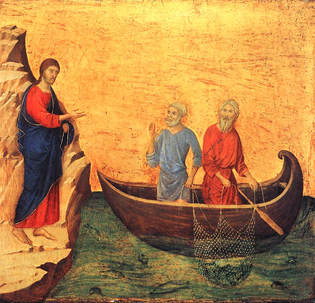 Mark 1:14-20 ‘The time has come’ he said ‘and the kingdom of God is close at hand. Repent, and believe the Good News.’ (Mark 1:15) One of the most annoying things a satnav can say is, “Use the next roundabout to make a U-turn.” Unfortunately, it is also something that I hear often. And if you’re anything like me, you would find it rather frustrating precisely because there, in the middle of your plodding along and trying to find your way through the traffic, the satnav suddenly reminds you that something has gone wrong – heck, not something, but that you have gone down the wrong road – and that only possible way to reach your destination is to turn around immediately and go back to the appointed route. Today’s gospel – and first reading for that matter – does precisely that, as we hear the Lord Jesus saying, ‘Repent, and believe the Good News.’ To repent literally means to turn around. To repent is to turn around and away from what we are doing, and to re-orient ourselves toward Jesus. Just as at Mass we all orient ourselves in one and the same direction towards the Lord present on the altar, so we are called to do in life, as Jesus invites us to make a U-turn from our self-centred, self-seeking (and sometimes self-destructing) ways, and start to follow after him instead. Simple enough to say, but what does repentance actually look like in practice? Perhaps unfortunately, repentance has been badly typecast, and I guess most of us would associate it with doing penance, with giving up things for Lent, with fasting and putting on sackcloth like the citizens of Nineveh, and even with a time of boring, joyless sobriety. But all these things are just tools to lead us to true repentance, which is simply a genuine movement of both heart and mind towards Christ… the start of a journey in his direction. Mark’s gospel gives us a practical example of what repentance should look like by describing how the first disciples begin to follow Jesus. Last Sunday we read together a passage of John’s gospel where Jesus is manifested by John the Baptist as the Christ. In that version of the events, John and Andrew immediately start to follow Jesus after that testimony. But Mark presents us with the different version of the events, where it is Jesus who calls Peter and Andrew, and then James and John to follow. So which one was it? Which version of the events is more likely to be a true account of what happened when the first disciples encountered the Lord? I personally would suggest that John’s description of how him and Andrew begun their journey with Jesus is probably the more accurate, because John the Evangelist was actually one of the people involved. However, there is no need to set one version against the other, because they both agree in putting the same two points across. First, Jesus is this hugely charismatic and compelling figure and whether his call to them was individual and explicit or not, the disciples are instinctively drawn to him, to attach themselves to him. Secondly, to follow Jesus means repenting; turning away and leaving one’s life behind in order to be with the Lord. And this aspect is more prominent is Mark’s version. See how Peter and Andrew are surprised by Jesus in the middle of their working day, and how James and John are called by the Lord in the ordinariness of their daily routine... When the Lord calls them, it’s not like they don’t have anything else to do. As fishermen they own their own businesses, so to speak; they have families to provide for and things to do. Yet, all of them turn away from what they were doing, because they can instinctively see that to follow Jesus is far more important than anything else. So without a word they make their first steps in a new direction, in a new life. And for them this is the beginning of true, life-long repentance. It is never easy to realise when we are going wrong, to eat humble pie and to make a U-turn. But if we carry on and let ourselves be guided by social conventions, bad habits, unfulfilling occupations, or human values with very little meaning, our journey through life can easily become an aimless (if not disastrous) wandering along unsuitable roads. Yet, turning around is always possible and well worth the effort; to repent and accept the gospel is to make the first steps is a new direction toward something different, something better, and something altogether more satisfying.
0 Comments
Your comment will be posted after it is approved.
Leave a Reply. |
Archives
June 2020
Categories
All
|
 RSS Feed
RSS Feed


